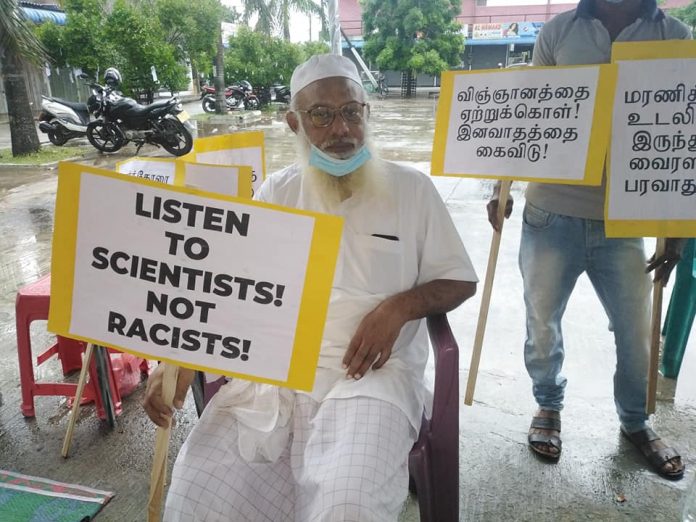
A demonstrator in Kalmunai protests against Sri Lanka's forced cremation policy. Phote: ColomboPage.
Politicians, activists and journalists participated in a protest in Amparai on Sunday, opposing Sri Lanka’s forced cremation of Muslims on grounds of COVID-19, reported ColomboPage.
Campaigners gathered in Kalmunai and displayed placards urging authorities to “listen to experts and not racists” regarding the issue.
Demonstrators held placards and posters in Tamil, English and Sinhalese and white ribbons were tied to a tree, during the protest in solidarity against the government’s insistence to cremate victims, despite it contradicting Muslim beliefs of burying the dead.
Earlier this week, several protests took place across the Tamil Homeland as Tamils and Muslims came together to resist the Sri Lankan government’s policy of compulsory cremations for Muslim victims who have allegedly contracted COVID-19.
Following international criticism regarding the issue, Sri Lanka contemplates shipping Muslim bodies to the Maldives to be buried – however, it has faced intense backlash from Muslim organisations and opposing politicians – including former Maldives Foreign Minister, Dunya Maumoon.
The Muslim community has pleaded that their dead have the right to be buried in the land on which they lived on.
Around 50 Muslims have been forcibly cremated by the state out of a recorded 1224 deaths due to the coronavirus. With reports of Muslims who were denied burial rights although testing negative for COVID-19; including Shaykh, a 20 day old baby who was forcibly cremated against his parent’s wishes. The policy which opposes Islamic practice is in place, despite concerns raised by the UN and guidance from the World Health Organisation (WHO) stating that cremations for COVID-19 deaths are not compulsory.
Last week, Tamil National People’s Front (TNPF) leader GG Ponnambalam raised the issue in parliament, questioning
“Why is it that his government is acting in this most arbitrary manner in this very sensitive matter?” he asked. “What is it that prevents this government, even at this late hour, from changing its present course and doing the right thing by Sri Lanka’s religious minorities in allowing burials as being practised by over 190 countries in the world?”
We need your support
Sri Lanka is one of the most dangerous places in the world to be a journalist. Tamil journalists are particularly at threat, with at least 41 media workers known to have been killed by the Sri Lankan state or its paramilitaries during and after the armed conflict.
Despite the risks, our team on the ground remain committed to providing detailed and accurate reporting of developments in the Tamil homeland, across the island and around the world, as well as providing expert analysis and insight from the Tamil point of view
We need your support in keeping our journalism going. Support our work today.
For more ways to donate visit https://donate.tamilguardian.com.

